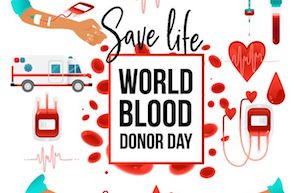We all know that donating blood is of huge benefit to others, saving the lives of accident victims, surgical and cancer patients, women who haemorrhage in pregnancy or childbirth, premature babies and children with anaemia. Yet the South African National Blood Service (SANBS) reports that less than 1% of us are active blood donors. Perhaps that would change if more people knew that there are also significant benefits for those donating blood:
Donating blood promotes general well-being
Giving blood boosts your mental and emotional well-being – according to a report by the Mental Health Foundation in the US, helping others can reduce stress, give a sense of belonging, reduce isolation and promote emotional well-being.
Donating blood is good for your heart
But beyond that, donating blood promotes physical health, by lowering your risk of heart disease and heart attack. It reduces the viscosity (thickness and stickiness) of your blood. And a study (in the Journal of Blood Medicine in 2013), found regular blood donation lowers your mean total cholesterol and low-density lipoprotein cholesterol (LDL or “bad” cholesterol). Regular donation may also lower your iron stores, which can further reduce your risk of heart attack, and it can help lower your blood pressure. A 2016 study in the journal Transfusion found people with high blood pressure had lower blood pressure after a year of donating blood, with those who donate at least four times having the greatest improvement.
It's a free blood check!
Giving blood provides you with a regular free blood check. In order to donate, you are required to undergo a health screening where SANBS staff check your pulse, blood pressure, temperature and haemoglobin/iron levels. This can help pick up problems that signal an underlying medical condition or a risk for certain conditions, which you can then follow up on. Your blood is also tested for a number of diseases, including hepatitis B and C, HIV and syphilis.
It's free and low-risk
All this is at no cost to you beyond about an hour of your time. There’s no risk of contracting any disease when you donate – new sterile equipment is used for every donor, says Sifiso Khoza, regional marketing manager for the SANBS. And if you feel a little lightheaded immediately after donating, you can simply lie with your feet up until you feel better. You can prevent this by drinking a glass or two of water before your appointment and eating a healthy meal low in fat.
The criteria to donate blood in South Africa
The benefits of donating blood are compelling – your only issue may be whether you qualify to donate. SANBS requirements are that you are aged between16 and 75, weigh at least 50kg, are in good health, pass the free blood check, have not donated in the last 56 days, and lead a low-risk life (don’t inject yourself with drugs, or have multiple sex partners, or a partner who has multiple sexual partners).
To find out more about donating, visit https://sanbs.org.za. Take the “Can I save 3 lives today” quiz to see if you can donate blood today.
IMAGE CREDIT: 123rfcom

